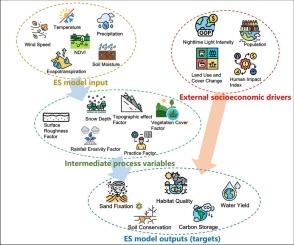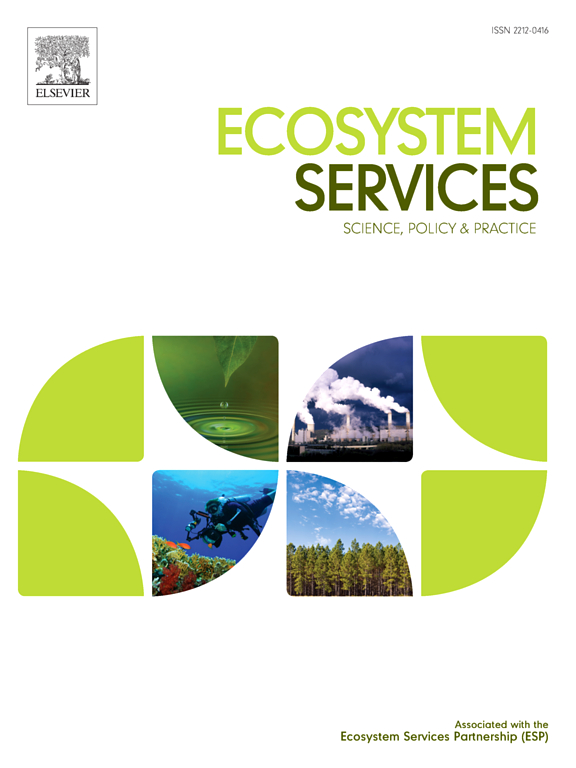Ecosystem service tradeoff and synergy mechanisms in the Central Asian terminal lake basin based on Bayesian Networks
IF 6.6
2区 环境科学与生态学
Q1 ECOLOGY
引用次数: 0
Abstract
In recent years, the shrinkage of terminal lakes in Central Asia has triggered environmental degradation and disrupted the supply of critical ecosystem services (ES). Understanding the tradeoffs and synergies among ES in these basins is essential for promoting sustainable regional development and enhancing ecological resilience. This study quantified the spatiotemporal dynamics of five major ES: soil conservation, sand fixation, water yield, carbon storage, and habitat quality using process-based ecosystem models. A Bayesian Network model was constructed to disentangle the effects of natural and anthropogenic influences on ES and identify their dominant drivers. To further characterise ES interactions, we developed a directional tradeoff/synergy strength index that captures both the intensity and directionality of inter-ES relationships. The results revealed spatially heterogeneous tradeoff patterns, with certain ES pairs exhibiting strong conflicts despite sharing similar drivers. Scenario-based optimisation highlighted regional differences in ES priorities, for instance, balancing carbon storage and water yield in the Amu Darya Basin, and managing the interplay of sand fixation, water yield, and soil conservation in the Ili River Basin. These findings provide a decision-support basis for targeted ecosystem management in arid terminal lake regions.

基于贝叶斯网络的中亚末端湖盆生态系统服务权衡与协同机制
近年来,中亚末端湖泊的萎缩引发了环境退化,并扰乱了关键生态系统服务(ES)的供应。了解这些流域生态系统之间的权衡和协同作用对于促进区域可持续发展和增强生态复原力至关重要。本研究采用基于过程的生态系统模型,量化了土壤保持、固沙、水量、碳储量和生境质量5个主要生态系统的时空动态。构建贝叶斯网络模型,理清自然和人为影响对ES的影响,并确定其主导驱动因素。为了进一步表征ES相互作用,我们开发了一个定向权衡/协同强度指数,该指数可以捕捉ES内部关系的强度和方向性。结果显示了空间异质性的权衡模式,尽管共享相似的驱动因素,但某些ES对表现出强烈的冲突。基于场景的优化突出了生态系统优先事项的区域差异,例如阿姆河流域的碳储量和水量平衡,以及伊犁河流域固沙、水量和土壤保持的相互作用管理。研究结果可为干旱末端湖区生态系统定向管理提供决策支持依据。
本文章由计算机程序翻译,如有差异,请以英文原文为准。
求助全文
约1分钟内获得全文
求助全文
来源期刊

Ecosystem Services
ECOLOGYENVIRONMENTAL SCIENCES&-ENVIRONMENTAL SCIENCES
CiteScore
14.90
自引率
7.90%
发文量
109
期刊介绍:
Ecosystem Services is an international, interdisciplinary journal that is associated with the Ecosystem Services Partnership (ESP). The journal is dedicated to exploring the science, policy, and practice related to ecosystem services, which are the various ways in which ecosystems contribute to human well-being, both directly and indirectly.
Ecosystem Services contributes to the broader goal of ensuring that the benefits of ecosystems are recognized, valued, and sustainably managed for the well-being of current and future generations. The journal serves as a platform for scholars, practitioners, policymakers, and other stakeholders to share their findings and insights, fostering collaboration and innovation in the field of ecosystem services.
 求助内容:
求助内容: 应助结果提醒方式:
应助结果提醒方式:


